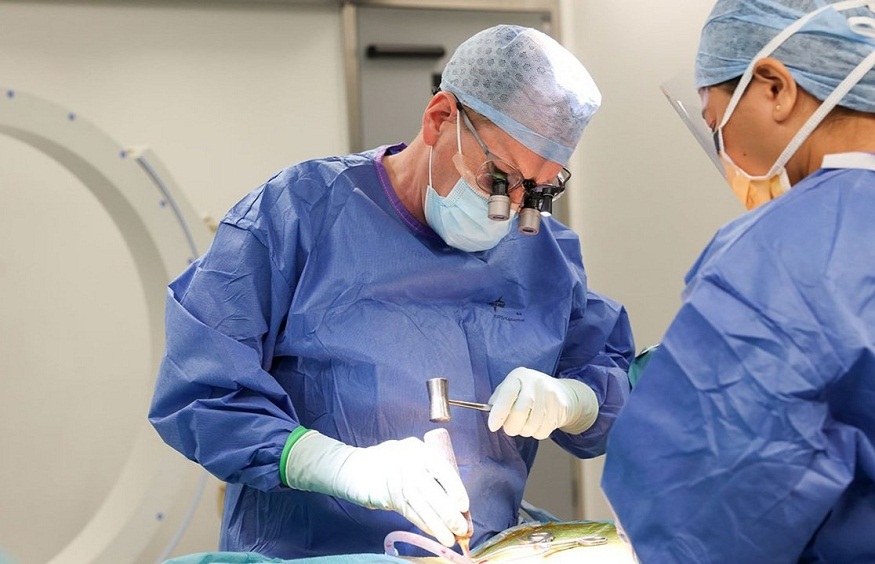The Future of Predictive Biomarkers in Personalized Spine Surgery

As spinal surgery continues to evolve, precision and personalization are taking center stage. Rather than relying solely on general protocols or anatomical imaging, today’s surgeons are increasingly looking at molecular and genetic data to guide their decisions. Dr. Larry Davidson, an expert in spinal surgery, recognizes predictive biomarkers as one of the most promising tools for tailoring procedures to each patient’s unique biology.
These biomarkers, measurable indicators found in blood, tissue or genetic material, offer insight into how a patient’s body might respond to surgery. They can reveal which complications a person may be at risk of and how well they’re likely to heal. When combined with AI and advanced analytics, they have the power to transform spinal surgery from a one-size-fits-most approach into a highly individualized, data-driven experience.
What Are Predictive Biomarkers?
Predictive biomarkers are biological molecules that signal the likelihood of a future medical outcome. In the context of spinal surgery, they might indicate how well a patient will tolerate anesthesia, whether they are prone to excessive inflammation, how likely they are to achieve spinal fusion or if they have a higher risk of infection or hardware rejection.
Examples include inflammatory markers like C-Reactive Protein (CRP), genetic variations affecting bone density or pain sensitivity and proteins involved in tissue repair or immune response. These insights go beyond traditional diagnostics and offer a deeper look into patient-specific surgical risk and recovery profiles.
Why Biomarkers Matter in Spine Procedures
Every spinal procedure carries its own set of risks and recovery variables. Due to subtle biological differences, two patients undergoing the same fusion surgery can have completely different outcomes. Biomarkers help explain why and, more importantly, what can be done to adapt the care plan accordingly.
For instance, a patient with elevated levels of pro-inflammatory cytokines may benefit from preoperative anti-inflammatory strategies. Someone with markers suggesting poor bone regeneration may need bone graft substitutes or longer immobilization post-surgery. The predictive power of biomarkers makes these targeted actions possible.
The Role of AI in Biomarker Analysis
Analyzing biomarker data is complex, especially when combined with a patient’s clinical history, imaging, medications and genetics. This is where artificial intelligence becomes critical. AI systems can analyze large datasets, reveal hidden patterns and create personalized risk models that guide everything from surgery planning to recovery tracking.
Machine learning models can also continuously improve as more patient data is collected, making predictions more accurate over time. As more surgeons and clinics adopt AI-assisted biomarker platforms, spinal surgery will become increasingly data-informed at every level.
Enhancing Surgical Planning Through Biomarker Profiling
Before a spinal procedure, biomarker screening can help guide a surgeon’s choice of technique, implant type and rehabilitation strategy. For example:
- Patients with poor wound-healing markers may benefit from minimally invasive techniques.
- Those with elevated coagulation biomarkers might require anticoagulant adjustments.
- Genetic markers related to opioid metabolism can inform pain management plans in advance.
This type of biomarker-guided planning reduces guesswork and creates a framework for more predictable, optimized outcomes.
Anticipating and Preventing Complications
Many common post-surgical complications, like infection, delayed fusion or chronic inflammation, can now be anticipated using predictive biomarkers. These indicators act like warning signals that allow providers to intervene before the complication takes hold.
If a patient has markers that suggest susceptibility to infection, they might receive extended antibiotic coverage or additional wound care. If bone healing capacity appears low, the surgical team may opt for more robust fusion materials or advanced bone stimulation technology. These targeted interventions make surgery safer and more efficient.
Guiding Postoperative Recovery and Rehabilitation
Biomarker monitoring doesn’t stop after surgery. Continued tracking can offer insight into how well the patient is healing, whether inflammation is resolving and if any complications are brewing beneath the surface.
AI-integrated platforms can alert the care team when a biomarker falls outside expected ranges, prompting early adjustments to therapy, medication or follow-up schedules. This kind of proactive monitoring supports a smoother recovery process and may reduce the need for readmissions or revisions.
Future Biomarkers on the Horizon
As research progresses, new biomarkers with predictive value are being discovered regularly. These may include:
- Genomic markers that predict responsiveness to biological treatments
- Microbiome profiles that impact healing and infection resistance
- Metabolomic data that reveal nutritional status or inflammation at the cellular level
- Neurotransmitter indicators that suggest pain sensitivity or mood-related risks
With AI as an analytical partner, these emerging data points will further refine how spinal care is delivered, making each procedure more informed than the last.
Ethical Use and Clinical Oversight
The integration of biomarker data into spine care raises important ethical considerations. Patients should be informed about how their biological data is collected, used and stored. Consent must be clear, and privacy protections should meet the highest standards.
Clinicians must also use biomarker insights as a guide, not an absolute. Just because a patient has a high-risk marker does not mean they should be denied care; rather, their care should be adapted and supported more intentionally.
Training Surgeons to Use Biomarker Intelligence
As biomarker-guided care becomes more mainstream, surgical teams will need training on how to interpret and apply this new data. Many medical institutions are beginning to integrate biomarker education into spine surgery fellowships and continuing education programs.
Understanding how to integrate these molecular insights with imaging, clinical signs and patient history is key to building truly personalized treatment plans.
Precision Spine Surgery
The future of spine surgery lies in precision, and predictive biomarkers are a cornerstone of that evolution. With every new data point, clinicians move closer to understanding how each patient will respond to surgery and how to design interventions that maximize safety, comfort and long-term function.
Dr. Larry Davidson explains, “A merger of AI and 3D printing could result in the production of an implant that uniquely serves the needs of a specific patient.” While implants represent one part of this shift, biomarkers add another layer of intelligence. Together, they help surgical teams personalize care from the molecular level up.
From Molecules to Meaningful Outcomes
Predictive biomarkers bring the internal story of the patient into focus. Instead of relying solely on visible anatomy or standard protocols, surgeons can now access deeper biological insights that influence healing, inflammation and surgical tolerance. This gives care teams the ability to develop strategies that reflect the patient’s physiology, rather than assuming everyone follows the same recovery path.
When combined with AI and related technologies, biomarkers support more accurate planning, early complication detection and personalized interventions. These tools enhance every phase of care, from preoperative preparation to long-term follow-up.
This shift reflects more than technological progress. It signals a broader transformation in spinal care, where safety, precision and patient-specific outcomes are becoming the standard rather than the exception. As predictive biomarkers become more widely used, they will help make truly personalized spine surgery not only possible but expected.






